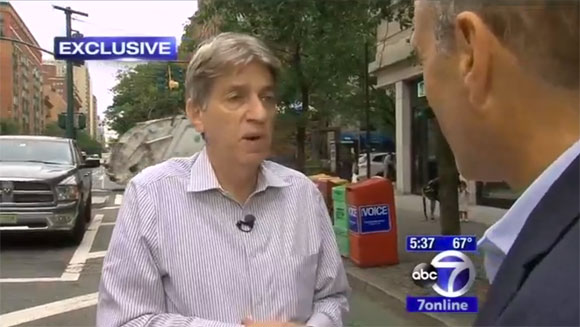
It's 2014. For at least 50 years, it's been apparent that wider streets don't make congestion go away. For about a decade, the work of UCLA professor Donald Shoup has popularized the notion that parking prices are key to the efficient operation of commercial streets, and London has shown the English-speaking world how to cut down on traffic by charging for road space. And for the last seven years, new protected bike lane designs have proven effective at preventing deaths and injuries on New York City streets.
If you lead the transportation committee of a New York City community board and a local TV news crew wants you to validate the view that a bike lane has screwed up traffic, maybe some of this thinking should seep into your comments. Maybe you should point out that the bike lane has made people safer, and it makes no sense to blame congestion on a street design when poor curb management and free roads pretty much guarantee gridlock at peak hours.

But that's not how Andrew Albert, the co-chair of Manhattan Community Board 7's transportation committee, responded when ABC 7 went fishing for quotes to pin traffic congestion on protected bike lanes. "There's frequent gridlock here," Albert said in front of the cameras. "If there's a truck making a delivery on either side of the avenue, you're sometimes down to one or two moving lanes." Clearly, if the bike lane went away, no delivery trucks would be blocked by cars at the curb and traffic could flow as God intended.
In his committee chairmanship at CB 7, which represents the Upper West Side, Albert is a gatekeeper for any street reform in a district that's home to more than 200,000 people. His performance for ABC 7 is an extension of how he's used this obscure, unelected perch to delay and block proposals like protected bike lanes and a car-free Central Park since the 1990s.
Albert embodies how the community board system can be hijacked by a small number of people to stonewall changes that have broad community support. No matter how many signatures are collected in favor of a street redesign, no matter how many people crowd into the room to show they want change, Albert is a reliable vote against reallocating space from cars. When public support for a project is too overwhelming for him to obstruct, he resorts to gaming the procedure.
Albert, like other community board lifers who prevent streets from being redesigned, is an appointee. After he'd served a few years, let alone a few decades, it would have been appropriate for elected officials to hand his transportation committee responsibilities to someone else. Someone who stays current with best practices in street design and transportation policy. Someone whose views are consistent with citywide policy goals that call for a swift reduction in traffic violence. But a long line of City Council members and borough presidents have let him remain.
Current Council Member Helen Rosenthal, a bike commuter who has made no effort to expand bike lanes in her district, isn't exactly shaking things up at Community Board 7, which she herself chaired for a time. And Borough President Gale Brewer has said that instead of removing community board members like Albert, who've served far longer than any NYC elected is allowed to serve, she'll focus on adding new members. This policy does little to ensure the turnover of powerful positions like committee chairmanships.
There are people like Albert on every community board who've held office for a generation, don't know the first thing about how modern streets are designed and managed, and are out of step with the neighborhoods they purportedly represent. Without reforming how community boards are trained and composed, giving them final say over street safety projects, as DOT Commissioner Polly Trottenberg is inclined to do, will quickly put the de Blasio administration's Vision Zero goals out of reach.





